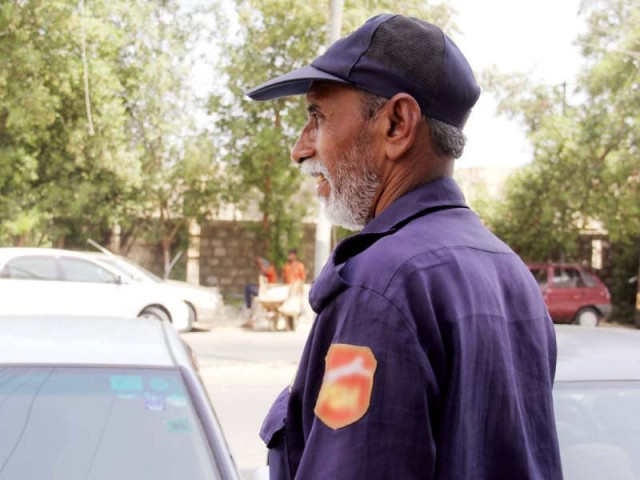The plight of outdoor uniformed workers
With constant exposure to sun, staff in uniform at greater risk of heatstroke than others

A security guard performing his duty wearing his uniform. Guards in uniforms are more likely to be affected by heat than others. PHOTO: AYESHA MIR/EXPRESS
Aged security guard Aslam Noor fainted during his 12-hour duty due to extreme heat this week and was rushed to a hospital by his colleagues. With days only getting hotter, Noor says working during summer is nothing short of a challenge. "We stand in the sun the entire day in our uniform and our health deteriorates because of such distressing working conditions," he says.
"My uniform is made of pure polyester. Only my God and I know what's going on inside my body. It is like hell fire," Noor states.
Tackling the heatwave: Details of measures sought from Sindh government, NEPRA
Dr Munawar Khursheed, assistant professor at Aga Khan University Hospital (AKUH), says bad-quality uniforms increase the risk of falling sick due to heat. "Uniformed workers who constantly remain outdoors have higher intake of heat than others and if their outfit is not of good quality, the heat is trapped inside their body. This makes them more vulnerable to heatstroke," he says.
While heatstroke is an extreme case, Dr Khursheed says uniformed workers can also suffer from heat exhaustion, which results in dizziness, vomiting and mild fever.
The right uniform
Having suffered from heat at work quite a few times, security guard Noor knows the role clothing plays in maintaining body temperature and says there should be different uniforms for summer and winter seasons. He recommends shalwar kameez over shirt and trousers because they are airy. AKUH's Dr Khursheed agrees it will be a better option. "Cultural dresses are always in line with the weather conditions of the area but sadly we have this liking for wearing pants," says Dr Khursheed, adding that if employers cannot replace trousers and shirt with shalwar kameez for uniforms, they can at least make sure the fabric is of high quality.
Heatwave likely to hit by end May or early June: Met dept
Dr Khursheed says because uniforms usually cover full body and are tight fitted, they prevent air from passing through the cloth and cooling the body. "The heat and sweat are trapped inside and the body's temperature-regulating mechanism fails," he says.
The doctor advises that uniforms should be made of soft fabric, stitched loosely and of light colours as they reflect sunlight. He further recommends making cap a part of all uniforms as it prevents direct exposure to the sun.
Danish Qamar, director of uniforms manufacturing firm DS Collection, agrees a good outfit will have all these qualities but says clients mostly order uniforms made from blended fabric - a mix of cotton and polyester, to keep cost low. "Our job is to give all the options to our clients but the final decision is theirs and we simply follow instructions," he says.
Capitalism in action
Despite fainting at work, Noor was back on duty the next day because he cannot afford to lose his income. "This month, I have taken five days off because of health problems. Who will compensate for my salary cuts? Taking a leave for sickness means double expenses - lost income and medicine cost," Noor shares sadly, lamenting that the employers don't provide them with the right facilities but are quick to deduct money when they fall sick and skip work.
Uniform manufacturer Qamar says most clients choose low-quality fabric for uniforms to cut expenses and only a few concern themselves with the well-being of their staff and purchase fine material. "The difference in price can be between Rs200 and Rs600 per set if an inferior quality fabric is used to make uniforms," Qamar tells us.
Sadeeq Baloch, a security guards supervisor, says those who hire guards at maximum give Rs16,000 per person and the amount is used to cover the cost of salaries, weapons and uniforms. Expressing disappointment over the state of affairs, Baloch says employers don't pay enough and the poor people suffer as a result. "The rich who employ guards live a luxurious life oblivious to the reality but are quick to criticise if the guards fail to do their job. They will never understand the problem until they burn in this heat themselves," he says.
Published in The Express Tribune, June 12th, 2016.



















COMMENTS
Comments are moderated and generally will be posted if they are on-topic and not abusive.
For more information, please see our Comments FAQ